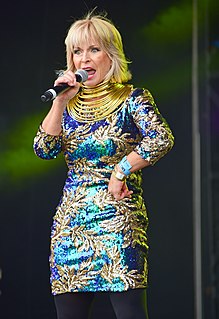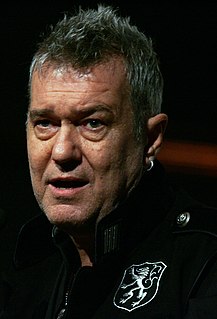A Quote by Toyah Willcox
I take books on learning to bed - music theory, colour theory - and usually my brain thinks, 'Um, I think I'd rather turn off,' than learn something.
Related Quotes
Moral theory develops from the divine command theory of medieval Christian philosophy, mixed up with a bit of ancient pagan virtue theory, to the purely secular moral sentiment and interpersonal reaction theories of Smith and Hume, to Kant's attempt to restore command theory but with something supersensible in the individual rather than God as the source of authority.
I had two passions when I was a child. First was to learn about Einstein's theory and help to complete his dream of a unified theory of everything. That's my day job. I work in something called string theory. I'm one of the founders of the subject. We hope to complete Einstein's dream of a theory of everything.
I think it's often easier to theorize in the official codes of theory rather than to theorize lightly through scene, object, story, and incident in ways that keeps alive the sensual serendipities of language. This is not a question of being for or against theory, but rather of being suspicious of orthodoxies that concede, in advance, that what passes for theory must be signaled by a narrowing of diction, sentence rhythms, and sensual awareness. I'm in favor of surprise.
If the theory accurately predicts what they [scientists] see, it confirms that it's a good theory. If they see something that the theory didn't lead them to believe, that's what Thomas Kuhn calls an anomaly. The anomaly requires a revised theory - and you just keep going through the cycle, making a better theory.
I think that there is something that happens, a phenomenon that happens around a conspiracy theory, where if you believe in a conspiracy theory, then every critique of that theory is simply more proof that the conspiracy exists. And I think that that's something that goes on in the person of Donald Trump.
Creationists reject Darwin's theory of evolution on the grounds that it is "just a theory". This is a valid criticism: evolution is indeed merely "a theory", albeit one with ten billion times more credence than the theory of creationism - although, to be fair, the theory of creationism is more than just a theory. It's also a fairy story. And children love fairy stories, which is presumably why so many creationists are keen to have their whimsical gibberish taught in schools.
The word constructionism is a mnemonic for two aspects of the theory of science education underlying this project. From constructivist theories of psychology we take a view of learning as a reconstruction rather than as a transmission of knowledge. Then we extend the idea of manipulative materials to the idea that learning is most effective when part of an activity the learner experiences as constructing a meaningful product.
I sat in on some songwriting classes, and it was really bloody hard, a lot of music theory. I'd be sitting there, and they'd be talking all this music theory, and the teacher would say, 'Let's ask our guest Jimmy what he thinks,' and I'd be sitting there thinking, 'Please don't ask me, please don't ask me.'




































